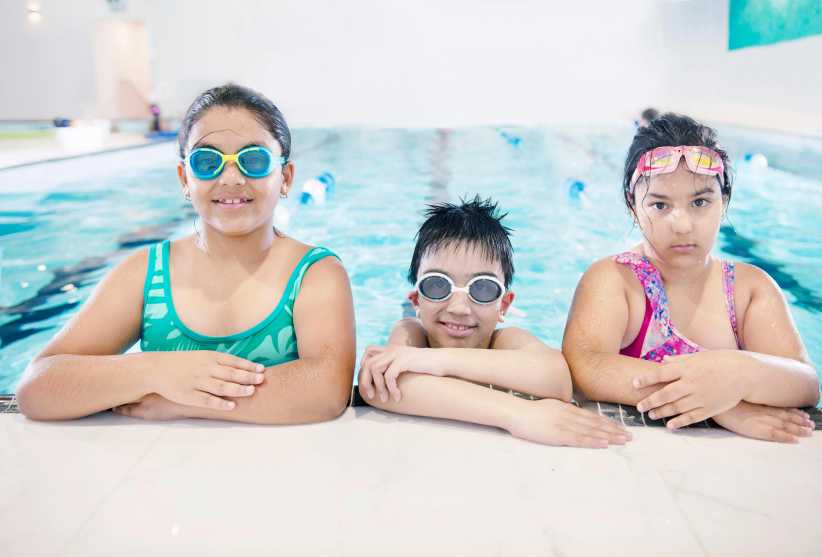
On a Saturday morning in July, I head up to West 117th Street to a colorful storefront on the corner of Lenox Avenue. In the windows hang large, animated pictures of children smiling broadly, with cute outfits and adorable hairdos. These are the children of GiGi’s Playhouse, a new kind of social center and support organization that is dramatically changing the way local children with Down syndrome and their families go about their lives.
The moment I walk through the Playhouse entrance, sensory stimulation of the best kind leaps out at me from all sides: Three people walk up and invite me in. Smiles abound. Bold, primary colors permeate the room and children and adults move around energetically as they get ready for the morning’s music and dance class and the afternoon’s fundraiser tag sale.
GiGi’s Playhouse first opened its doors in Manhattan in February. It joins a list of host cities that includes Atlanta, Des Moines, and Chicago, where the organization was originally started by Nancy Gianni, whose third child, GiGi, was born with Down syndrome. “I just kept thinking, ‘Why isn’t there a place for us?’” Gianni explains on the organization’s website (gigisplayhouse.org). “That is what propelled me to create a place where families could come for resources and networking, where kids and adults with Down syndrome could be the leaders, where we could celebrate our diagnosis.”
Inspired by how much GiGi’s means to families, local moms Tracy Nixon and Debbie Morris led an extensive effort over the last few years to establish the local chapter.
The results?
“In only a few short months, GiGi’s has welcomed over 500 new people through its doors—and, often, there are 30 people or more at a particular program,” Executive Director Britt Sady tells me.
Many parents I spoke with had been looking for a place in Manhattan like GiGi’s for a long time. Surprisingly, the resources for Down syndrome support are very decentralized, which means that most parents have to make the links themselves between different therapeutic, advocacy, and educational institutions. But with GiGi’s as a kind of central hub, it’s a lot easier for parents to get good information, while taking advantage of a programming menu that ranges from new parent support groups to physical therapy for the kids to its newest initiative: its Literacy Program. Plus, both parents and children alike take advantage of the Playhouse’s social and recreational offerings.
To truly appreciate what a game changer GiGi’s is for many families, think of it this way:

Social isolation is often a problem for children with special needs, especially as they get older. But at GiGi’s, children with Down syndrome have the potential to develop friendships and lasting bonds with other children because of the opportunity to see each other regularly in a welcoming place. And while GiGi’s model focuses on Down syndrome, they also welcome children with other special needs.
During my visit, I am struck by the large groups of people who come through the doors. While a parent can certainly take a single child to an event, it’s quite common for entire families to come to GiGi’s and get involved. There’s one family member, Richard Reilly, who is grandfather not just to his grandson Louis who has Down syndrome, but also to the entire Playhouse. Reilly became involved through his stepdaughter, Jennifer Patterson, President of the Board of GiGi’s Playhouse New York City. When Patterson asked her stepfather to help out, he replied, “You really want me to help? Because if I’m in, I’m in.” Reilly has since become a ubiquitous presence at the Playhouse, as integral to its existence as the beautiful stage and Big Apple-themed murals he and his wife built for the space.
It’s time for the dance and music class to begin. Music is first. Sabrina Francis, a professional opera singer who volunteers at the playhouse, sits on the stage with a keyboard across her lap. “All right, you all. Let’s start some music.” Her beautiful voice rises above the kids. The boys and girls gather around her.
As the music class draws to a close and the movement class begins, another parent, Henry Lazo, smiles as he describes the Playhouse’s impact upon his daughter Natalia, who is four-and-a-half. “The center gives her freedom to socialize. She’s comfortable. It seems like she’s at home. When they do music and she sings, she feels this is her domain.… We had a hard time finding this in New York City. When we found GiGi’s, it was a home run.”
For more info Gigi’s Playhouse, visit gigisplayhouse.org or call 646-801-7529
Also, you may want to read “The 20 Things To Know If Your Child Has Special Needs.”





















